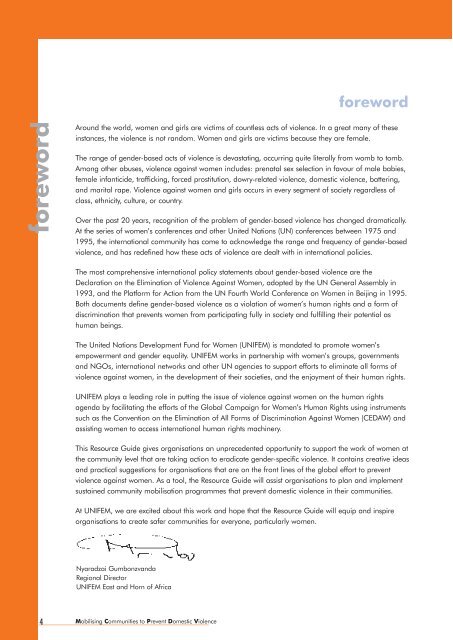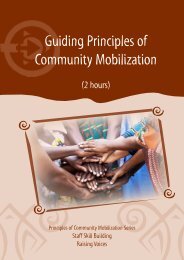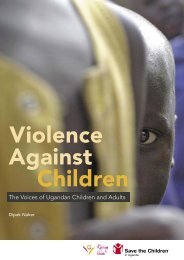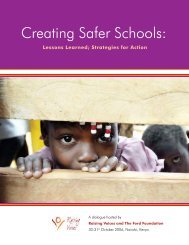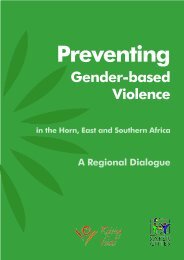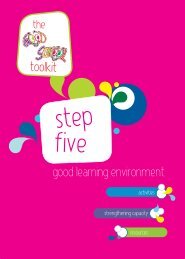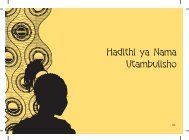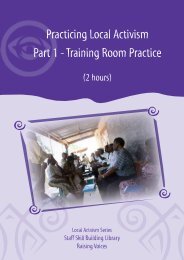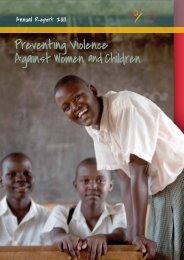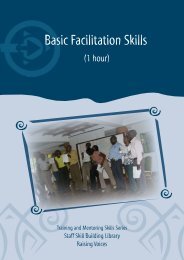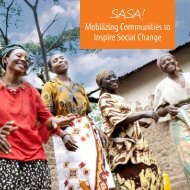Mobilising Communities to Prevent - Raising Voices
Mobilising Communities to Prevent - Raising Voices
Mobilising Communities to Prevent - Raising Voices
- No tags were found...
Create successful ePaper yourself
Turn your PDF publications into a flip-book with our unique Google optimized e-Paper software.
foreword<br />
foreword<br />
Around the world, women and girls are victims of countless acts of violence. In a great many of these<br />
instances, the violence is not random. Women and girls are victims because they are female.<br />
The range of gender-based acts of violence is devastating, occurring quite literally from womb <strong>to</strong> <strong>to</strong>mb.<br />
Among other abuses, violence against women includes: prenatal sex selection in favour of male babies,<br />
female infanticide, trafficking, forced prostitution, dowry-related violence, domestic violence, battering,<br />
and marital rape. Violence against women and girls occurs in every segment of society regardless of<br />
class, ethnicity, culture, or country.<br />
Over the past 20 years, recognition of the problem of gender-based violence has changed dramatically.<br />
At the series of women’s conferences and other United Nations (UN) conferences between 1975 and<br />
1995, the international community has come <strong>to</strong> acknowledge the range and frequency of gender-based<br />
violence, and has redefined how these acts of violence are dealt with in international policies.<br />
The most comprehensive international policy statements about gender-based violence are the<br />
Declaration on the Elimination of Violence Against Women, adopted by the UN General Assembly in<br />
1993, and the Platform for Action from the UN Fourth World Conference on Women in Beijing in 1995.<br />
Both documents define gender-based violence as a violation of women’s human rights and a form of<br />
discrimination that prevents women from participating fully in society and fulfilling their potential as<br />
human beings.<br />
The United Nations Development Fund for Women (UNIFEM) is mandated <strong>to</strong> promote women’s<br />
empowerment and gender equality. UNIFEM works in partnership with women’s groups, governments<br />
and NGOs, international networks and other UN agencies <strong>to</strong> support efforts <strong>to</strong> eliminate all forms of<br />
violence against women, in the development of their societies, and the enjoyment of their human rights.<br />
UNIFEM plays a leading role in putting the issue of violence against women on the human rights<br />
agenda by facilitating the efforts of the Global Campaign for Women’s Human Rights using instruments<br />
such as the Convention on the Elimination of All Forms of Discrimination Against Women (CEDAW) and<br />
assisting women <strong>to</strong> access international human rights machinery.<br />
This Resource Guide gives organisations an unprecedented opportunity <strong>to</strong> support the work of women at<br />
the community level that are taking action <strong>to</strong> eradicate gender-specific violence. It contains creative ideas<br />
and practical suggestions for organisations that are on the front lines of the global effort <strong>to</strong> prevent<br />
violence against women. As a <strong>to</strong>ol, the Resource Guide will assist organisations <strong>to</strong> plan and implement<br />
sustained community mobilisation programmes that prevent domestic violence in their communities.<br />
At UNIFEM, we are excited about this work and hope that the Resource Guide will equip and inspire<br />
organisations <strong>to</strong> create safer communities for everyone, particularly women.<br />
Nyaradzai Gumbonzvanda<br />
Regional Direc<strong>to</strong>r<br />
UNIFEM East and Horn of Africa<br />
4 <strong>Mobilising</strong> <strong>Communities</strong> <strong>to</strong> <strong>Prevent</strong> Domestic Violence


